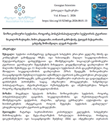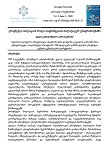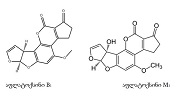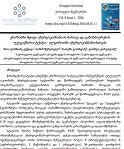Molecular features of tubo-ovarian epithelial changes in ovarian epithelial tumours
Critical Review
Downloads
The etiology and pathogenesis of ovarian serous carcinomas as well as prognoses and clinical management are still under vigorous research. The data provided by many studies support the idea that ovarian serous carcinomas are mainly influenced by the changes occurring in the fallopian tube epithelium. This theory is supported by molecular lesions present in high-grade ovarian cancers and fallopian tube neoplasms. This topic needs some additional studies using pathogenetic characteristics like proliferative and apoptotic changes, which will further support and even may take it under suspicious the theory that ovarian carcinomas are originating from the fallopian tube. It is also crucial to study hormonal expressions while there is a lot of information that steroid hormones have a huge role in the pathogenesis of ovarian carcinomas but there is almost very little data on how these influences are related to the fallopian tube neoplasms. A deeper understanding of ovarian tumours and their etiological pathways are important to prevent and determine prognoses, which will enable better therapeutic methods. It has utmost importance to study additional characteristics like stem cell distribution in the fallopian tube epithelium and in ovarian neoplasms. The cancer heterogeneity need also further discussion regarding ovarian cancer novel classifications. This will finally aid the modification of better-personalized treatment.
Downloads
Rexhepi M, Trajkovska E, Ismaili H, Besimi F, Rufati N. Primary Fallopian Tube Carcinoma: A Case Report and Literature Review. Open Access Maced J Med Sci. 2017;5(3):344-348. Published 2017 May 20. doi:10.3889/oamjms.2017.044
Khazaei Z, Namayandeh SM, Beiranvand R, Naemi H, Bechashk SM, Goodarzi E. Worldwide incidence and mortality of ovarian cancer and Human Development Index (HDI): GLOBOCAN sources and methods 2018. J Prev Med Hyg. 2021;62(1):E174-E184. Published 2021 Apr 29. doi:10.15167/2421-4248/jpmh2021.62.1.1606
Kurman RJ, Shih IeM. The origin and pathogenesis of epithelial ovarian cancer: a proposed unifying theory. Am J Surg Pathol. 2010;34(3):433-443. doi:10.1097/PAS.0b013e3181cf3d79
Jarboe E, Folkins A, Nucci MR, Kindelberger D, Drapkin R, Miron A, Lee Y, Crum CP. Serous carcinogenesis in the fallopian tube: a descriptive classification. Int J Gynecol Pathol. 2008 Jan;27(1):1-9. doi: 10.1097/pgp.0b013e31814b191f. PMID: 18156967.
Fathalla MF. Incessant ovulation and ovarian cancer - a hypothesis re-visited. Facts Views Vis Obgyn. 2013;5(4):292-297.
Feng D, Zhao T, Yan K, Liang H, Liang J, Zhou Y, Zhao W and Ling B: Gonadotropins promote human ovarian cancer cell migration and invasion via a cyclooxygenase 2-dependent pathway. Oncol Rep 38: 1091-1098, 2017
Ricciardi E, Baert T, Ataseven B, Heitz F, Prader S, Bommert M, Schneider S, du Bois A, Harter P. Low-grade Serous Ovarian Carcinoma. Geburtshilfe Frauenheilkd. 2018 Oct;78(10):972-976. doi: 10.1055/a-0717-5411. Epub 2018 Oct 19. PMID: 30364401; PMCID: PMC6195427.
Neff RT, Senter L, Salani R. BRCA mutation in ovarian cancer: testing, implications and treatment considerations. Ther Adv Med Oncol. 2017 Aug;9(8):519-531. doi: 10.1177/1758834017714993. Epub 2017 Jun 19. PMID: 28794804; PMCID: PMC5524247.
Kotsopoulos J, Narod SA. Prophylactic salpingectomy for the prevention of ovarian cancer: Who should we target? Int J Cancer. 2020 Sep 1;147(5):1245-1251. doi: 10.1002/ijc.32916. Epub 2020 Feb 29. PMID: 32037528.
Soong TR, Kolin DL, Teschan NJ, Crum CP. Back to the Future? The Fallopian Tube, Precursor Escape and a Dualistic Model of High-Grade Serous Carcinogenesis. Cancers (Basel). 2018 Nov 28;10(12):468. doi: 10.3390/cancers10120468. PMID: 30486509; PMCID: PMC6316244.
Kuhn E, Kurman RJ, Vang R, Sehdev AS, Han G, Soslow R, Wang TL, Shih IeM. TP53 mutations in serous tubal intraepithelial carcinoma and concurrent pelvic high-grade serous carcinoma--evidence supporting the clonal relationship of the two lesions. J Pathol. 2012 Feb;226(3):421-6. doi: 10.1002/path.3023. Epub 2011 Dec 23. PMID: 21990067; PMCID: PMC4782784.
Hatano, Y., Fukuda, S., Makino, H. et al. High-grade serous carcinoma with discordant p53 signature: report of a case with new insight regarding high-grade serous carcinogenesis. Diagn Pathol 13, 24 (2018).
Vergara D, Tinelli A, Martignago R, Malvasi A, Chiuri VE, Leo G. Biomolecular pathogenesis of borderline ovarian tumors: focusing target discovery through proteogenomics. Curr Cancer Drug Targets. 2010 Feb;10(1):107-16. doi: 10.2174/156800910790980269. PMID: 20088785.
Roberts CM, Cardenas C, Tedja R. The Role of Intra-Tumoral Heterogeneity and Its Clinical Relevance in Epithelial Ovarian Cancer Recurrence and Metastasis. Cancers (Basel). 2019 Jul 30;11(8):1083. doi: 10.3390/cancers11081083. PMID: 31366178; PMCID: PMC6721439.
Ho SM. Estrogen, progesterone and epithelial ovarian cancer. Reprod Biol Endocrinol. 2003 Oct 7;1:73. doi: 10.1186/1477-7827-1-73. PMID: 14577831; PMCID: PMC239900.
McDonnel AC, Van Kirk EA, Isaak DD, Murdoch WJ. Inhibitory effects of progesterone on plasma membrane fluidity and tumorigenic potential of ovarian epithelial cancer cells. Exp Biol Med (Maywood). 2003 Mar;228(3):308-14. doi: 10.1177/153537020322800310. PMID: 12626776.
Lenhard, M., Tereza, L., Heublein, S. et al. Steroid hormone receptor expression in ovarian cancer: progesterone receptor B as prognostic marker for patient survival. BMC Cancer 12, 553 (2012).
Leite DB, Junqueira MG, de Carvalho CV, Massad-Costa AM, Gonçalves WJ, Nicolau SM, Lopes LA, Baracat EC, da Silva ID. Progesterone receptor (PROGINS) polymorphism and the risk of ovarian cancer. Steroids. 2008 Jul;73(6):676-80. doi: 10.1016/j.steroids.2008.02.005. Epub 2008 Feb 23. PMID: 18384825.
Copyright (c) 2022 Tamar Dzotsenidze , Arsen Gvenetadze , George Burkadze

This work is licensed under a Creative Commons Attribution-NonCommercial-NoDerivatives 4.0 International License.


























































































































































































































